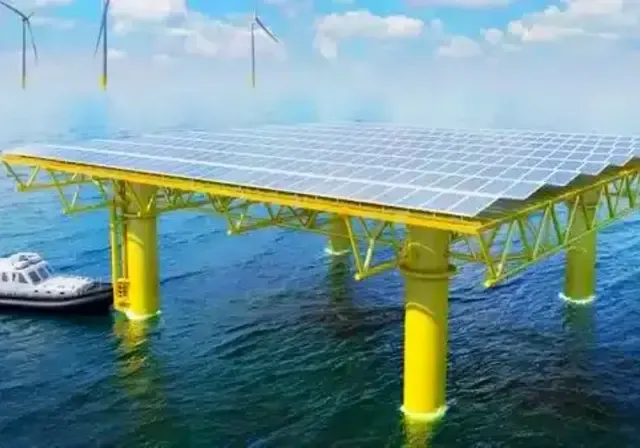Understanding of Marine Floating Solar Technology
In an era where energy sustainability takes center stage, innovations continue to emerge to create more environmentally friendly solutions.
One recent breakthrough that has captured attention is marine floating solar technology, promising the efficient and sustainable harnessing of solar energy.
What Is Marine Floating Solar Technology?
Marine floating solar technology is a form of photovoltaic system positioned above the sea surface.
Unlike conventional solar installations on land, this technology is specifically designed to operate on the open sea.
It involves the use of floating structures engineered to withstand environmental challenges at sea, such as waves, wind loads, and high salinity levels.
 |
| Offshore floating solar technology (illustration) |
Why Do We Need Marine Floating Solar Technology?
Following are some of the main advantages of Marine Floating Solar Technology, including:
- Renewable Energy: Like solar panels in general, this technology generates electrical energy from sunlight, which is a renewable energy source.
- Performance Optimization: Typically, solar panels produce more energy when directly exposed to sunlight. By placing these panels above water, shadows from buildings or vegetation on land are avoided, optimizing the potential performance of solar panels.
- Effective Cooling: The water surrounding solar panels can act as a natural cooling mechanism, enhancing the efficiency of converting solar energy into electricity. Lower temperatures generally improve the performance of solar panels.
- Land Conservation: One of the main advantages is that this technology allows the utilization of land that was previously unusable for this purpose. This is crucial, especially in areas with limited land or high land requirements.
- Water Management: In some implementations, floating structures can contribute to water management by minimizing water evaporation from the underlying water surface.
These advantages make Marine Floating Solar Technology an attractive option in many regions, especially in countries with substantial water expanses. The technology is still evolving, with continuous improvements in design and system efficiency to optimize performance and environmental impact.
Challenges in Marine Floating Solar Technology
While the Floating Photovoltaic (FPV) system offers numerous advantages, it is not without its challenges. Some of these include:
- Environmental Impact: The installation of floating solar panels may affect aquatic ecosystems, potentially disrupting marine life and water quality. Careful environmental assessments are crucial to mitigate these impacts.
- Maintenance and Durability: Exposure to water poses challenges in terms of maintenance and the durability of floating solar systems. Corrosion, biofouling, and wear-and-tear from constant contact with water require innovative solutions.
- Weather and Climate Risks: Floating solar installations are susceptible to extreme weather events, such as storms, strong winds, and waves. Designing structures that can withstand these conditions is essential to ensure the longevity of the technology.
- Water Body Management: Floating solar arrays can impact water bodies' usage and management. Addressing issues like navigation, fishing, and water resource utilization is crucial for the acceptance and sustainability of the technology.
- Economic Viability: While land conservation is a benefit, the economic viability of floating solar technology depends on factors such as installation costs, energy production efficiency, and the long-term durability of the systems. Balancing these factors is essential for widespread adoption.
- Regulatory and Permitting Challenges: Navigating complex regulatory frameworks and obtaining permits for floating solar projects can be challenging. Clear guidelines and streamlined processes are necessary to facilitate the implementation of these technologies.
Addressing these challenges requires collaboration among stakeholders, including researchers, policymakers, environmentalists, and industry experts, to ensure the responsible development and deployment of Marine Floating Solar Technology.
The Future of Marine Floating Solar Technology
Despite being in the development stage, marine floating solar technology holds significant potential for a substantial contribution to renewable energy production. With continued innovation and research, we can anticipate further growth in the utilization of this technology in the future.
Marine floating solar technology is not only an intriguing innovation but also a representation of global efforts to explore more sustainable sources of renewable energy. As this technology continues to evolve, we can expect an increasingly significant role in achieving clean and sustainable energy goals.
Photo source - www.oedigital.com.
